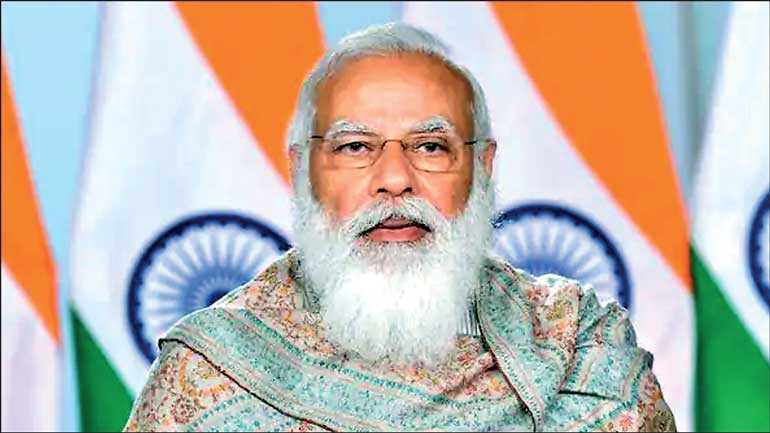Thursday Feb 19, 2026
Thursday Feb 19, 2026
Wednesday, 10 March 2021 00:00 - - {{hitsCtrl.values.hits}}

It would not be in India’s long-term interest to pave way for the international body to be provided with an opportunity to directly interfere in an internal affair of a member of the world community, especially a country in South Asia, where India is the super power
By Sugeeswara Senadhira
New Delhi is in an unenviable situation over the UNHRC (United Nations Human Rights Council) resolution on Sri Lanka as it would not be in India’s long-term interest to pave way for the international body to be provided with an opportunity to directly interfere in an internal affair of a member of the world community, especially a country in South Asia, where India is the super power.
India, on one hand, is worried that such a resolution would set an unwanted precedent for the international bodies to directly interfere in a member country, and that could work against India or any other country one day.
At the same time India is not at all happy about recent statements made by different sections in Sri Lanka over the future of the India-backed Provincial Council system, future of economic cooperation, Colombo Port terminal deals as well as proposed wind power projects in islands off the northern peninsula.
Indian sources confirmed that India was heavily involved in behind-the-scene informal consultations to redraft some of the clauses of the resolution on Sri Lanka. There are several other countries with internal conflicts vary of strongly-worded resolutions on any country and India is in consultation with most of them.
The core group of countries – United Kingdom, Canada, Germany, North Macedonia, Malawi and Montenegro – working on Sri Lanka’s issue at the UNHRC holding informal consultations with others to draft the final version of the resolution, which Sri Lanka has already rejected. During the informal consultations most of the core group wanted strong wording of the resolution. They were backed by several European countries including Norway, Sweden, Denmark, Finland and Ireland.
On the other hand China, Russia, Cuba, Pakistan and the Philippines stood for Sri Lanka and they made strong objections to the resolution. They pointed out that the Core Group, in its statement, paid tribute to the people of Sri Lanka and expressed the wish to highlight its ongoing commitment to accountability, reconciliation, and inclusive peace in Sri Lanka.
“We recognise and welcome the progress made by the Government of Sri Lanka in rebuilding infrastructure, demining, land return and resettling internally displaced persons. However, it is clear that more needs to be done to address the harmful legacies of war and build a sustainable peace in the country,” the Core Group said.
In view of the above acknowledgement, the countries supporting Sri Lanka urged the Core Group to be more sensitive to Sri Lanka’s difficulties and to collaborate with Colombo instead of acting with highhandedness and arrogance.
The draft resolution has been revised ahead of a 16 March deadline and further revisions are likely after a third informal consultation this week between the co-sponsors of the resolution and concerned countries. Geneva reports indicated that Asian nations including Japan, Indonesia, South Korea and Bangladesh await a cue from India before taking the final decision on the resolution.
As already reported, Canada and the UK, vociferous supporters of the resolution, were making attempts to influence UNHRC members.
Canadian High Commissioner David McKinnon held a meeting with Bangladesh High Commissioner Tareq Ariful Islam. He later tweeted confirming that the Sri Lanka Core group members, Canada and the UK, are campaigning hard to muster support for their resolution against Sri Lanka at the UNHRC.
The media reports added that UK High Commissioner Sarah Hulton had also met South Korean Ambassador Woonjin Jeong around the same time. The report also notes that such a meeting between these envoys were rare, and the core group wants to muster support for the resolution at the 47-member UNHRC, of which South Korea and Bangladesh are members.
Many UNHRC member nations faced with threats of terrorism and internal conflicts will not be happy with some clauses of the draft proposal as they would set a precedent for future actions on any country.
For example, clause 6 of the draft reads: Recognises the importance of preserving and analysing evidence relating to violations and abuses of human rights and related crimes in Sri Lanka with a view to advancing accountability, and decides to strengthen the capacity of the Office of the High Commissioner to [collect], consolidate, analyse and preserve information and evidence and to develop possible strategies for future accountability processes for gross violations of human rights or serious violations of international humanitarian law, to advocate for victims and survivors, and to support relevant judicial proceedings in Member States with competent jurisdiction.
Several Asian and African members believe this would result in serious infringement on sovereignty of a country. They are of the opinion that there are several such clauses needing redrafting during informal consultations. Hence, the final round of consultations would decide the fate of the final resolution.
[The writer is Director (International Media), Presidential Secretariat.]